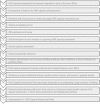Institutional capacity for health systems research in East and Central African schools of public health: experiences with a capacity assessment tool
- PMID: 24888213
- PMCID: PMC4067125
- DOI: 10.1186/1478-4505-12-21
Institutional capacity for health systems research in East and Central African schools of public health: experiences with a capacity assessment tool
Abstract
Background: Despite significant investments in health systems research (HSR) capacity development, there is a dearth of information regarding how to assess HSR capacity. An alliance of schools of public health (SPHs) in East and Central Africa developed a tool for the self-assessment of HSR capacity with the aim of producing institutional capacity development plans.
Methods: Between June and November 2011, seven SPHs across the Democratic Republic of Congo, Ethiopia, Kenya, Rwanda, Tanzania, and Uganda implemented this co-created tool. The objectives of the institutional assessments were to assess existing capacities for HSR and to develop capacity development plans to address prioritized gaps. A mixed-method approach was employed consisting of document analysis, self-assessment questionnaires, in-depth interviews, and institutional dialogues aimed at capturing individual perceptions of institutional leadership, collective HSR skills, knowledge translation, and faculty incentives to engage in HSR. Implementation strategies for the capacity assessment varied across the SPHs. This paper reports findings from semi-structured interviews with focal persons from each SPH, to reflect on the process used at each SPH to execute the institutional assessments as well as the perceived strengths and weaknesses of the assessment process.
Results: The assessment tool was robust enough to be utilized in its entirety across all seven SPHs resulting in a thorough HSR capacity assessment and a capacity development plan for each SPH. Successful implementation of the capacity assessment exercises depended on four factors: (i) support from senior leadership and collaborators, (ii) a common understanding of HSR, (iii) adequate human and financial resources for the exercise, and (iv) availability of data. Methods of extracting information from the results of the assessments, however, were tailored to the unique objectives of each SPH.
Conclusions: This institutional HSR capacity assessment tool and the process for its utilization may be valuable for any SPH. The self-assessments, as well as interviews with external stakeholders, provided diverse sources of input and galvanized interest around HSR at multiple levels.
Figures
References
-
- World Health Organization. The Mexico Statement on Health Research: Knowledge for Better Health: Strengthening Health Systems. Geneva: WHO; 2004.
-
- World Health Organization. The Bamako Call to Action on Research for Health: Strengthening Research for Health, Development, and Equity. Geneva: WHO; 2008.
-
- Bennett S, Adam T, Zarowsky C, Tangcharoensathien V, Ranson K, Evans T, Mills A, Agyepong I, Hu S, Lavis J, Makubalo L, Rannan-Eliya R, Sanchez D, Tomson G. From Mexico to Mali: progress in health policy and systems research. Lancet. 2008;372:1571–1578. doi: 10.1016/S0140-6736(08)61658-X. - DOI - PubMed
Publication types
MeSH terms
LinkOut - more resources
Full Text Sources
Other Literature Sources


